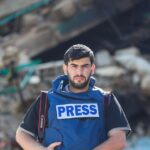
Palestinian Resistance fighters from Al-Quds Brigades operate a mortar in January, 2024. Photo: Saraya Al-Quds Telegram Channel.

Orinoco Tribune – News and opinion pieces about Venezuela and beyond
From Venezuela and made by Venezuelan Chavistas

Palestinian Resistance fighters from Al-Quds Brigades operate a mortar in January, 2024. Photo: Saraya Al-Quds Telegram Channel.
Two weeks after the occupation army began withdrawing from many areas in northern Gaza, the momentum of the ground operations has shifted to the eastern neighborhoods of Gaza City (Haraat al-Daraj and Al-Tuffah), and the central camps (Al-Maghazi, Al-Bureij, and Al-Nuseirat), alongside the major operation occurring in the city of Khan Yunis in the southern part of the Gaza Strip. Resistance in the northern regions does not seem inclined to allow a peaceful repositioning of the occupation forces, as over the past two weeks, the Resistance continued to carry out impactful operations that targeted “Israeli” tanks in their new positions.
For instance, from Tuesday (January 2) night to Wednesday morning, the resistance engaged in five clashes at different contact points. These operations forced the occupation army to return to the neighborhoods of Al-Tawam and Jabalia Al-Balad, in order to prevent the Resistance from reaching the occupation force’s sleeping quarters and camps on the eastern and western outskirts of the northern strip. In the past five days alone, the zionist entity has daily reported dozens of its soldiers killed and injured.
In Al-Tuffah and Haraat al-Daraj, it is evident how closely the resistance is predicting the occupation force’s behavior. Videos aired by both the Al-Qassam Brigades and the Al-Quds Brigades not only display the Resistance fighters’ proficiency and bravery in confronting invading soldiers and tanks, but also how they humiliate an enemy that is armed with the most advanced in mechanized vehicles and tanks. Within a distance of 10 meters, a resistance fighter armed with anti-tank weaponry calmly waits for orders to launch Yassin-105 shells at the most opportune time. The most prominent theme at this stage of the war appears to be the powerful imagery, where the Resistance showcases daily an impressive array of field performances, meticulously depicted in what seems like footage captured by professional cameras.
As for the southern part of the Gaza Strip, the peak of the conflict at the moment and the most intense battleground, the occupation has deployed about 300 tanks and a considerable number of special forces. Despite more than 30 days passing since the commencement of the attack there, where the occupation’s tanks penetrated deep into the eastern and western regions of Khan Younis, the resistance has not been pushed out of the territory. Instead, resistance fighters emerge between alleys and buildings, and from the balconies of houses, surprising occupation soldiers from point-blank range, executing their tasks with an extreme level of professionalism and calm nerves before disappearing.
Throughout its ground operation in that area, the occupation has been unable to assert total control. It failed to conduct foot patrols to sweep through homes, as is typically expected in any ground incursion, and inadequately reinforced the less fortified areas inside the city. Even at the Abu Oreiban site that houses occupation soldiers south of Al-Zaytoun, which is heavily protected by the occupation’s earthen barricades and swarmed with surveillance and espionage cameras, Al-Quds Brigades executed a qualitative missile and artillery attack. Resistance fighters launched dozens of 107 mm guided missiles from openings they had carved into a residential building opposite the site. Additionally, they bombarded it with rockets, artillery, and accurate mortar shells from various locations.
In summary, we can estimate that since the start of the ground operation, the Resistance has destroyed over 1000 army vehicles of the occupation and still maintains control of the battlefield. The Resistance holds the reins because no front has collapsed, and no faction has been defeated. Amidst all this, the so-called “cleansing” operation conducted by the zionist forces in fiercely resistant areas like Beit Hanoun, Jabalia, Sheikh Radwan, and Shuja’iyya resembles what any physician who disregards their professional oath would do: superficially treating wounds without care. Thus, the occupation is forced to retreat from areas of the Strip that it occupied, burdened by the disappointment of continued field ineffectiveness and the weight of the blood of innocent Palestinians.
(Al-Akhbar) by Yousef Fares
Translation: Orinoco Tribune
OT/DZ/SC

Yousef Fares is a Palestinian reporter in Gaza. He is an author at Al-Akhbar News and he regularly posts updates on his telegram channel.